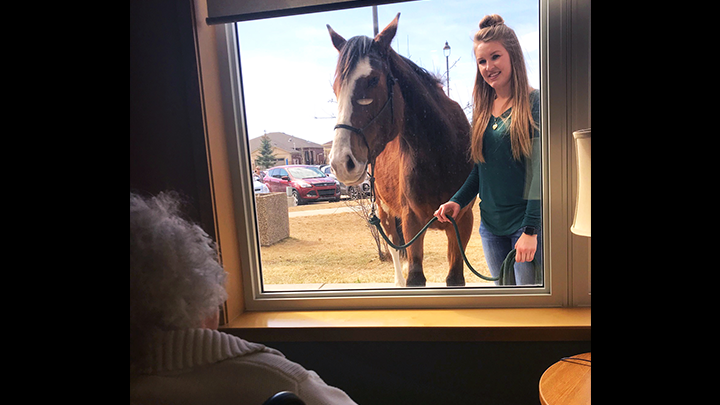
May 29, 2020

Recreation Therapist Alicia Parker tours her horse, Sahara, outside the windows of residents of Extendicare Michener Hill in Red Deer.
Story by Tracy Kennedy
Where there’s a will, there’s a way. That’s the motto recreation therapists in Central Zone are living by as they help seniors in long-term care and supportive living environments adjust to the new normal — and find new reasons to smile.
Responsible for removing barriers to meaningful recreation and leisure activities to improve a patient’s quality of life, Alberta Health Services (AHS) recreation therapists have had to adapt the majority of residents’ activities since the COVID-19 pandemic took hold.
Among the changes, group activities are limited to five residents or less, all must maintain physical distancing and shared objects are prohibited — a huge pivot from the way things are normally run.
“I miss bowling and curling in the rec room,” said Lee Kaiser, a long-term care resident at the Wetaskiwin Hospital and Care Centre. “But you guys brought the activities into our rooms and I am thankful. I look forward to hallway Bingo, and today I got out for an hour of the Fun & Fitness group, and I feel good.”
The most significant impact to residents and staff have been the restrictions on socializing in groups and on visits from family and volunteers — prompting staff to find innovative ways to ensure residents’ cognitive, social and emotional needs are met.
“‘Creative’ is not even close to describing the extent to which the recreation therapy teams have surpassed to maintain positive quality-of-life experiences for their residents,” said Michelle Richard, recreation therapy professional practice lead in Central Zone. “They are keeping spirits up in the face of vigilant restrictions while keeping our most vulnerable population safe.”
Staff quickly focused on preventing social isolation as a priority, with technology playing a pivotal role. Staff facilitate regular FaceTime visits so residents can talk to their families by iPad — a critical connection for seniors, many of whom enjoyed daily in-person visits prior to COVID-19.
On Mother’s Day, Wetaskiwin long-term care organized special visits for female residents, allowing one essential visitor to meet with the resident outside on the patio. One senior had additional family members attend, so after the solo visit, recreation therapist and clinical site lead Sudha Devaraj connected the woman with the rest of her family outside her room window through FaceTime.
“I am so pleased to see so many of my family gather for me. This virus cannot stop them, can it?” said Frances Litzenberger, 94.
“I put the speaker on and put it right next to Frances,” said Devaraj. “Some of her family brought lawn chairs and the kids were playing. It can be very emotional, and I assured her that they were right here, we were so close, and that it was just a silly window in between them.”
Windows have become a portal to some normalcy — and also to memory. Staff have arranged visits with a variety of animals including everything from a baby bison to ducks, dogs and horses. Recreation therapist Alicia Parker, who arranged a horse visitation at Extendicare Michener Hill in Red Deer, acknowledged the logistics can be tricky — but said it’s worth it.
“Many of the seniors in care facilities in this area grew up on a farm or ranch, so seeing a horse not only sparks joy but can prompt the resident to reminisce — an excellent tool for cognitive stimulation — and it removes them momentarily from the pandemic,” said Parker.
“A staff member inside brought residents to the window, and the change in expressions was so moving. They just brighten up, they’re amazed, and most times you can see them immediately engage.”
The creative examples are numerous and often involve members of the surrounding community.
Bagpipers have shown up at the Innisfail Health Centre to the delight of long-term care residents. Chapel service in Wetaskiwin was livestreamed for Easter.
Residents take part in trivia or reminiscing programs with others via Zoom or telephone across the zone. Across several sites, schoolchildren are writing to seniors.
Prior to COVID, programming and activities were designed to provide connection, purpose and belonging — goals that are still being met today.
Devaraj said one of her residents recently asked for the address of her new six-year-old pen pal, whose letters adorn the walls of the resident’s room.
“She said to me, ‘Sudha, I’m going to ask Bella what her favourite chocolate is, so I can buy her some for the next time I see her. She’s my friend now.’”